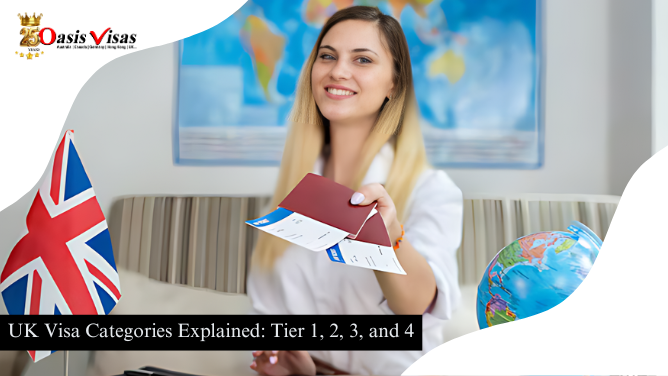
The UK is among the most sought-after countries for work, education, and business purposes. Thousands of individuals every year apply for a UK visa to establish their careers, settle down with their families, or acquire global education. But knowing the types of visas is a complicated process. The UK government has divided the visas into different tiers, one of which caters to every need.
Once you know the type of visa is appropriate in your case, it will better plan your application process and lead you to be successful. Within this guide, we will decode Tier 1, 2, 3, and 4 visas easily for you to grasp which among these is proper in your context.
Tier 1 UK Visa: High-Value Migrants
Tier 1 visa was created for people who could contribute a great deal to the economy of the UK, e.g., investors, entrepreneurs, and highly talented individuals. Nevertheless, this category has been extensively altered over the years. Subcategories under this visa have been shut down on numerous occasions, but some substitute options are offered.
- Innovator Visa: Replaced Tier 1 Entrepreneur visa. It is for those who wish to establish a business in the UK and have an innovative proposal endorsed by an endorsing body.
- Global Talent Visa: It is for highly skilled workers in areas like science, engineering, medicine, and arts. It replaced the Tier 1 Exceptional Talent visa.
- Investor Visa: Previously, those with at least £2 million to invest in the UK could apply under this category, but it was closed in 2022.
If you are a high-net-worth individual or have exceptional skills, you may still find suitable visa options under the UK’s points-based system that have replaced parts of Tier 1.
Tier 2 UK Visa: Skilled Workers
The Tier 2 visa was the most popular visa for skilled workers and enabled professionals to work in the UK if they had a job offer from an employer based in the UK. This visa category is now replaced by the Skilled Worker Visa under the new immigration system, but its objective is the same.
- In order to qualify, you will need to have a job offer from a UK employer who is licensed.
- Your work needs to be included on the list of approved occupations and be above the salary level (typically £26,200 a year or £10.75 an hour, but lower for shortage occupations).
- You must pass the English language test.
- The visa is typically given for a maximum of 5 years and can lead to permanent residency Indefinite Leave to Remain (ILR) in the UK.
This visa is suitable for experts in the fields of healthcare, engineering, and IT. It enables UK businesses to bring in talent from abroad to cover labor gaps.
Tier 3 UK Visa: Low-Skilled Workers
The Tier 3 visa was initially designed for low-skilled laborers in industries that experienced labor shortages. This visa category was never opened by the UK government, and it was later abolished. The government opted to replace low-skilled positions with European and domestic workers prior to Brexit.
There is no direct low-skilled work visa at present. There are, however, temporary work visas available, including the Seasonal Worker Visa, under which workers can undertake short-term agricultural work. If you seek low-skilled employment in the UK, you should explore other visa options.
Tier 4 UK Visa: Student Visa
Tier 4 visa was the main UK visa for overseas students. This has been taken over by the Student Visa as part of the new points-based system.
- You need to have an offer of a place by a UK school that is authorised to sponsor overseas students.
- You must provide evidence of having enough money to pay tuition fees and living costs.
- You need to satisfy the English language requirement.
- The visa will typically be issued for the length of your course and can grant restricted work rights (20 hours a week in term time and full-time during holidays).
It is also possible for students completing their degrees in the UK to apply for the Graduate Route, which enables them to remain and work for 2 years (or 3 years for PhD graduates) once they have completed their studies.
Which Visa is Right for You?
Selecting the correct UK visa is a function of your own circumstances:
- As a business leader or skilled worker, you could require an Innovator Visa or Global Talent Visa.
- As a skilled employee with a work contract, the Skilled Worker Visa (formerly Tier 2) is optimal.
- As a student, the Student Visa (formerly Tier 4) is appropriate.
- If you are seeking low-skilled employment, there are few choices, although the Seasonal Worker Visa could be an option.
It is essential to familiarize yourself with UK visa types to make sure you apply for the appropriate visa that suits your travel purpose. Although the Tier 1, 2, 3, and 4 system was widely replaced, the underlying principles continue under the new UK visa immigration system. Regardless of whether you are a professional, student, or businessperson, there is a visa that is right for you.
Ensure that you review the current UK visa immigration regulations and prepare your application thoroughly to enhance your chances of success. If you require assistance in choosing the appropriate visa or processing your application, seeking advice from our immigration specialist can assist you in going through the process without any hitches.











